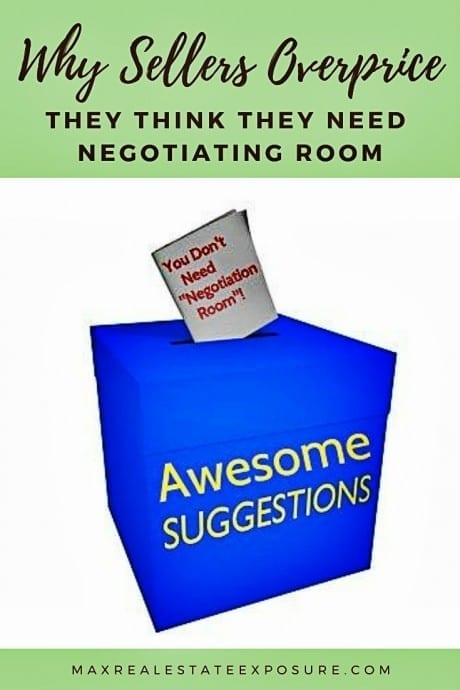Common Reasons For Overpriced Houses by Sellers
 Every week across the United States, overpriced houses are hitting the market.
Every week across the United States, overpriced houses are hitting the market.
Overpriced homes lead to no offers.
An overpriced house is usually easy to spot.
For most people, a home is their most prized possession. Homes cost a great deal of money, and they are often the place where lifetime memories are made.
These realities are undeniable – but they can negatively impact your ability to sell your house if you let emotion take over your logical side.
Overpricing a home is the most common way sellers sabotage their ability to get the most money for their property.
The common logic is that pricing a home higher will lead to a higher sale price – WRONG!
Price a home improperly, and you will create a slew of negative consequences, including no offers.
We will look at everything you need to know about overpriced houses so you can make better decisions.
What is an Overpriced House?
Overpriced housing is those properties with an asking price that does not match the current fair market value.
The real estate comps suggest that the property should be priced lower. Overpriced houses are typical in real estate sales. Every day thousands of properties across the country have price reductions.
An overpriced home will languish on the market with no offers. The days on the market will increase, which is counterproductive to selling for the best price.
How is Accurate Home Pricing Determined?
A couple of different methods determine accurate house pricing.
Home sellers can either hire a real estate agent to perform a comparative market analysis, often called a real estate CMA, or hire an appraiser to provide an appraisal.
The accuracy of both methods is determined by the qualifications and experience level of the person performing the evaluation. Most of the time, pricing a home correctly becomes less challenging with more time in the business.
You can see the differences between a real estate appraisal and CMA. The valuation techniques are similar but could have different uses.
The Reasons For Overpriced Houses That Lead to No Offers
Here are some of the more popular reasons sellers give for overpricing their home – a real problem when trying to sell promptly and for a reasonable price.
I’m Not in a Hurry to Sell
This is probably the most legitimate reason for setting a price on a home too high. If you are in no hurry to sell your house, you can specify your price.
Who knows, maybe someone will come along and be willing to pay far above market value. You may also win the lottery before the offer comes, making your need to sell even less.
If you do not need to sell your house at the price you can reasonably expect to get, it is probably worth skipping the whole selling process and waiting for a time that fits your needs.
The real estate market may go up, or it may go down, but the best time to sell is going to be when you want to get the sale done.Click To TweetThe Days on The Market Forms an Opinion About Overpriced Houses
Many homeowners fail to understand that time is your enemy, not your friend. While you may have all the time in the world to sell your home, the market looks at your home being on the market for a long time in a negative light.
A potential buyer has two things going on in their mind when they see a property languishing on the market.
- The first thought they will have is what’s wrong with the property. If nobody else has grabbed the home and it has been on the market this long, there must be a problem.
- The second thought that will enter a buyer’s mind is how much discount they can get. The longer a home is on the market, the more apt a buyer will place a lowball offer on your home. It is a fact that there is a strong relationship between the time on the market and the gap between the list price and the sale price.
I Can Always Come Down on My Price
This is technically true. You are in complete control of what price you accept for your property. It is yours, after all. The problem with this idea is that it fails to consider the realities of selling a home.
If your home does not sell promptly, it will eventually take on a negative stigma. As mentioned above, buyers are suspicious of homes that have been on the market too long.
It makes them think that you must not want to sell, that you are unreasonable, or that something is wrong with your home.
The longer they can think about this, the more common this perception becomes. It is also more likely that you will start getting offers you would never consider or none!
You can always come down on the price, but not pricing a home correctly from day one is a mistake that almost always has negative consequences.
I “Feel” My House is Worth X Amount of Dollars
Having feelings about your home is a natural thing. Most people have some emotional ties to the place they live. Unfortunately, selling a home is a business transaction.
While feelings can be helpful in business, they are not the ultimate deciding factor. The market is. If the market says your house is worth a certain amount of money, it doesn’t matter how strongly you feel otherwise.
Unless you find someone incredibly naive and with deep pockets – lenders always review the market value of a home before handing over money – the market will ultimately rule over the sale of your home.
If other similar homes are selling for substantially less than your house is, you can expect to sell at an equal dollar amount. Expecting anything else is unrealistic.
I Need This Much For Negotiating Room
 Many sellers believe you need a considerable spread between what a home is listed for vs. what it will ultimately sell for.
Many sellers believe you need a considerable spread between what a home is listed for vs. what it will ultimately sell for.
This is patently false. It is a prevalent misconception and one of the most common home pricing myths.
A real estate agent should be able to prove to a seller overpricing is a mistake by showing comparable sales data.
Several years ago, I was meeting with a seller who owned real estate in Upton, Massachusetts.
He was one of those stubborn sellers who think they know more about real estate than a professional.
He had himself convinced that his home needed to be priced almost $50,000 more than it should be because he would need “negotiating room” to come down.
Along the way, I figured out his thought process and emphasized clearly by showing him in black and white that most of the homes comparable to his were selling for around $10,000 less than asking.
Once he saw how off-base his thinking was, my advice about pricing property started to sink in.
Sometimes this is what it takes.
Showing people facts is a lot more powerful than telling them.
Seeing homes sitting stagnant on the market for an extended amount of time with multiple reductions is never the best way to get the maximum amount of money for a home.
A Similar House Sold For “This” Much More
You may have heard from your neighbors that a house just like yours sold one neighborhood over for a certain amount of money. Well, why can’t you sell yours for the same price? Your real estate agent just told you that your house is worth less.
Why? Your agent knows much about the current market, far more than you may realize. They have a vast network of information and other Realtors to draw on when deciding on the price of a house. They are also highly motivated to sell your home.
It is how money is made as a real estate agent. This means that even though your neighbor claims the other house was just like yours, your agent may know this is not the case.
They know your house is worth less, whether it is the neighborhood, different features, or something else. The truth is you need to go lower on your price.
Dreams Don’t Meet Reality With Overpriced Housing
One of the realities that Realtors encounter is sellers seeing what they want to see. They will try to tell you that the neighbor’s home down the street is the identical model to their home, but theirs is much better because of X, Y, and Z.
These things they think make their home better doesn’t mean a hill of beans. The seller proudly tells you they have a shed, a new septic system, and a deck built with heavy-duty nails.
You do your research as an agent and discover this identical home down the street has a new kitchen with granite counters, central air, a brick patio, and a 3 season porch. The owner you just met usually conveniently discounts these things in their mind or doesn’t realize they are there.
In any event, the home down the street is a superior property and worth a lot more than the unrealistic seller you just met with.
This scenario is also quite familiar for sale by owners who don’t take the time to meet with a Realtor or appraiser to get an accurate value for their home.
I Need a Certain Amount of Money
One of the tricky things about having a loan out on a property – much like with an automobile – is that sometimes the amount you owe on the loan outstrips the actual value of your property.
No matter how much you want things to be different, you are still tied to the market when it comes time to sell.
You may need a certain amount to pay off your mortgage, which could be more than you can get on the house right now.
There are two options in front of you at this point. You can go forward with the sale and take the hit or stay in the house and hope for better opportunities later.
What you cannot do is expect buyers to sympathize with you enough to spend thousands of more dollars on your home.
In the end, they do not care about your financial situation. They want a good deal and will do everything they can to get one – even passing up your home for a less desirable option based on its more competitive price.
A buyer cares about one thing – paying what the home is worth, not some delusional value based on someone’s unrealistic desires.
Zillow Says It’s Worth This Much
This could be the most amusing of all the crazy reasons sellers give for wanting to overprice their homes. Let’s get one thing straight: you have a better chance of seeing Bigfoot than seeing an accurate Zillow estimate.
Sellers and buyers are equally notorious for using Zillow as a valuation tool when it suits them. The problem is nobody with half a brain will rely on Zillow’s accuracy of home value estimates. They can be so far off it is incredible Zillow promotes such garbage on an otherwise impressive website.
Another Real Estate Agent Told Me It Was Worth X
 Most sellers want to believe in the best value they hear for their home.
Most sellers want to believe in the best value they hear for their home.
We all love our properties and think what we have is better than the next guys down the street. This, of course, is not always the case, and some agents will tell you whatever you want to hear to get your business.
When you sell your home, understanding this concept is vital – data does not lie; people do!
If every real estate agent but one is telling you your home is only worth a certain amount, it stands to reason that this agent isn’t telling you the truth.
Some Real Estate Agents Use Poor Valuation Methods
Sometimes the agent isn’t intentionally misleading a seller but instead is using information that leads to overpriced houses.
One of the most common is using price per square foot to determine the market value.
There aren’t many methods that are more inaccurate for figuring homes values.
Read the reference to see why using price per square foot leads to overpriced houses with no offers.
Why Buyers Don’t Make Offers on Overpriced Houses
The most common reason buyers do not make an offer on an overpriced home is that they don’t want to offend the seller. If the house is severely overpriced, they will also think there is no chance a seller would accept their “perceived” lowball offer.
Many buyers are embarrassed at making a low bid and don’t want to insult a seller.
Buyers often hold the mistaken assumption that sellers possess sophisticated knowledge of their home’s actual value. If they were willing to part with the property for less, they would reduce the price and sell it.
Potential home buyers often assume sellers must have turned down lowball offers from others, which is often not the case.
The reality is many overpriced houses have never received a serious offer. Sellers need to understand that making an offer on an overpriced home is something many buyers avoid.
How Do You Know if a House is Overpriced?
Overpriced properties usually stand out like a sore thumb. Other homes listed for sale are superior that are priced lower.
The neighborhood typically has other sales that don’t support the asking price. When no offers are made, the market time increases, further magnifying the problem.
How to Deal With Sellers Who Want to Overprice a Home
The best real estate agents walk away from listings where the seller is entirely unrealistic.
Unfortunately, there are a lot of Realtors that don’t know any better and feel that having an overpriced listing is better than not having one at all.
While you may be thinking, why would a real estate agent want to have an overpriced listing, the answer is a simple one.
They use the home to get business for other properties they may be selling or to have additional buyer clients. Every home draws a certain amount of phone calls, and if you are not a great agent obtaining a listing can help you get buyer calls.
Your home will be found on the most popular home-buying websites, which could lead to business.
Essentially the agent is picking up clients from the advertising of the overpriced home and spinning them elsewhere.
Intentionally Overpricing Houses is Bad Business
In my mind, this is NEVER a good way to do business if you consider yourself a professional. Intentionally overpricing a home to get a listing violates the code of ethics that Realtors are bound by.
Not only is it a poor business practice, but as an agent, you are creating a situation where a client will be dissatisfied. Once that happens, your stress level as a real estate agent increases tenfold.
Sellers will ask you to do unrealistic things that don’t work, like holding an open house weekly, putting a big ad in the Wall Street Journal, or calling them every two days for a progress update.
Of course, none of these things will cause the home to sell. Want a good laugh? Take a look at the ten ways to know a home is overpriced. This is a humorous look at how to know your home is not worth what you are asking and the things that real estate agents hear from homeowners who are completely unrealistic!
No thanks! Be authentic – be honest – be professional. Council sellers correctly on why it is crucial to price their home accurately, and don’t be afraid to walk away if they disagree.
If you are a homeowner reading this, hopefully by now, you have realized that overpricing a home is not the way to go if you want to get top dollar for your property.
Final Thoughts on Overpriced Houses
If you want your house to go under contract, price it correctly. It is that simple. Doing otherwise will hurt you financially.
If you plan on selling your home in the Metrowest, Massachusetts area, I welcome the opportunity to help you price your home correctly. Reach out for an interview.
Other Helpful Home Selling Articles
- Why do real estate agents take overpriced listings – learn why some real estate agents make it a practice of taking overpriced listings via The Balance.
- Ten of the best-kept secrets for selling a home – get some helpful advice for selling a house via HGTV.
Use these additional home-selling resources to make your sale go as smoothly as possible!
The above Real Estate information on overpriced houses: why sellers overprice their homes was provided by Bill Gassett, a Nationally recognized leader in his field. Bill can be reached via email at billgassett@remaxexec.com or by phone at 508-625-0191. Bill has helped people move in and out of many Metrowest towns for the last 37+ years.
Are you thinking of selling your home? I am passionate about real estate and love sharing my marketing expertise!
I service Real Estate sales in the following Metrowest MA towns: Ashland, Bellingham, Douglas, Framingham, Franklin, Grafton, Holliston, Hopkinton, Hopedale, Medway, Mendon, Milford, Millbury, Millville, Natick, Northborough, Northbridge, Shrewsbury, Southborough, Sutton, Wayland, Westborough, Whitinsville, Worcester, Upton and Uxbridge MA.

